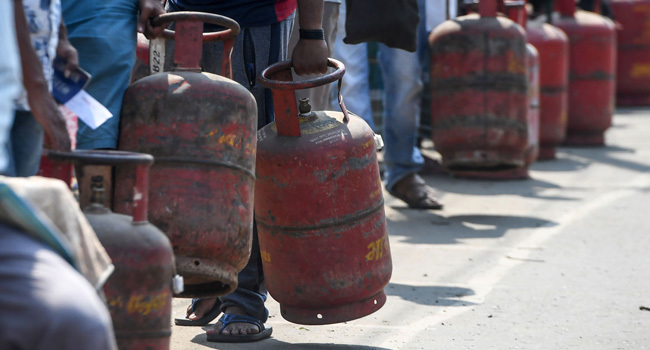The price of Liquefied Petroleum Gas (LPG), commonly known as cooking gas, continues to rise, causing Nigerians to express concern about its impact on their expenses.
Many residents of the Federal Capital Territory (FCT), said this in an interview with the News Agency of Nigeria (NAN) in Abuja on Sunday.
NAN reports that 1kg of cooking gas is being sold for between N1,260 to N1,500 depending on the location, and refilling a 12.5kg cylinder costs between N15,750 and N18,750 as against 12,500 to N13,000 in June and July.
The National Bureau of Statistics (NBS) latest cooking gas report for September showed that the average retail price for refilling a 5kg Cooking Gas cylinder increased by 4.19 per cent on a month-on-month basis from N6,430.02 recorded in August 2024 to N6,699.63 in September 2024.
Also, the average retail price for refilling a 12.5kg Cylinder Cooking Gas increased by 4.89 per cent on a month-on-month basis from N15,552.56 in August 2024 to N16,313.43 in September 2024.
Mr Nnamdi Opara, a businessman and father of two said he had to adjust his spending to accommodate the increase in cooking gas price.
“ When the prices of things increase, I just try to adjust to accommodate that thing, especially if it is a necessity like cooking gas.
“ I have a 12.5kg cylinder, but I have not filled it to that capacity for some time. So I buy like 5kg or a little more depending on the money I have.
“If I use just N16,000 to buy gas, then I won’t be able to meet other needs; it is not like income has increased, and we all know the situation of the economy.
“Government’s intervention is urgently re so Nigerians can breathe because we are not breathing,” he said.
Mrs Memunat Ogunyemi, a civil servant, said the increase in cooking gas had made some people return to traditional cooking options.
“I remember when the government was sensitising Nigerians on the need to stop deforestation and embrace the use of cooking gas.
“ I discouraged my mum and some of my family members from using charcoal and Kerosene, explaining to them that gas is faster and cleaner.
“At that time 12.5 cylinder of gas was N6,500. Today, that same size of cylinder is about N16,000 to N17,000, depending on your location.
“How many people can afford to buy it coupled with other expenses like food and transportation? My mum has gone back to using charcoal and I also use a charcoal stove as an alternative now.”
Ogunyemi added that the prices of accessories like cylinders, hose regulators, etc, had also increased.
Mrs Ella Joshua, a nurse and mother of three, said she could no longer afford to fill her 12.5kg cooking gas because of the continuous price increase
“I have not been filling my 12.5kg for a long time because I can not afford it, I only manage to fill 6kg per time.
“I resort to cooking with charcoal if I have many dishes/food to cook, but unfortunately, the price of charcoal is skyrocketing too as a bag is currently sold at N10,000.
“The government needs to hear the cries of Nigerians, the suffering is just too much,” she said.
Similarly, Mrs Happiness John, a businesswoman said she had to use a charcoal stove as an alternative because of the increasing cost of cooking gas.
“I have a charcoal stove which we put behind the house and use to boil things like tomatoes, beans and cow tail because they take longer to cook.
“I cannot afford to use gas alone to cook, not when the present cost of 12.5kg is selling for N16,500 now in my area.”
Mr Kareem Mohammed, a Manager at a gas station attributed the increase in cooking gas to low supply, adding that the local production was not sufficient to meet the demand.
“The Federal Government should address this issue of cooking gas production to ensure we produce enough here in Nigeria to meet the demands of the people,” he said.
NAN recalls that the National Assembly recently called on the Federal Government to reverse the recently increased prices of cooking gas and petrol.
The call followed a resolution to a motion by the Minority Leader, Rep. Kingsley Chinda (PDP-Rivers), at plenary.
According to Chinda, the rising cost of petrol and cooking gas poses a significant threat to the livelihoods of millions of Nigerians and unchecked inflationary pressure caused by the increased prices
This Chinda said can lead to social unrest, increased poverty rates, and negative long-term economic effects.
Experts have said the Federal Government needs to boost local production of LPG and address the foreign exchange issues to make importing the product cheaper so it becomes more affordable and accessible to Nigerians. (NAN)











